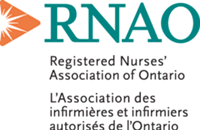Nurses and First Nations leaders come together to improve health
TORONTO, May 7, 2016 /CNW/ - Ontario nurses and First Nations leaders launched a partnership today aimed at eliminating health inequities and improving health care in the province's First Nations communities.
Leadership from the Registered Nurses' Association of Ontario (RNAO) signed a letter of intent with Ontario Regional Chief Isadore Day to work together to address the physical, mental, and spiritual health needs of Ontario's First Nations.
The agreement was signed on the final day of RNAO's 91st annual general meeting in Toronto, following a panel discussion on First Nations health that featured Chief Day, Chief Wayne Moonias of the Neskantaga First Nation, RNAO CEO Doris Grinspun, nurse practitioner Mae Katt, and Bearskin Lake resident Marty Beardy.
Topics for the panel, which was hosted by CBC News reporter Duncan McCue, included widespread opiate addiction in Ontario First Nations, and the suicide crisis in communities like Attawapiskat, where a state of emergency was declared in April after more than 100 people attempted suicide since September. Panellists also discussed poor living conditions in First Nations, including Moonias' Neskantaga First Nation, which has had a boil water advisory for more than 20 years.
"Recent events remind us that our health system will not be truly universal until it serves all Ontarians equally, including First Nations," says Grinspun. "We can no longer stand by while our First Nations people suffer. It's time to change the long history of discriminatory social, economic and health-care policies that have led us down this tragic path."
Together, RNAO and the Chiefs of Ontario will begin working to urge all levels of government to take action in First Nations communities to prevent suicide, mental health issues and addiction; improve social and environmental determinants of health; and improve health.
RNAO has long advocated for improved health services for First Nations people. The association's 2015 report Coming Together, Moving Forward: Building the Next Chapter of Ontario's Rural, Remote & Northern Nursing Workforce identified strategies for the effective retention and recruitment of nurses in remote Ontario communities – many of which are First Nations – and by building local capacity through supporting First Nations people to become nurses.
"Helping our First Nations communities heal will require decisive, respectful, and collaborative action," says Carol Timmings, president of RNAO. "Nursing will be a large part of these efforts, and we are eager and ready to play our part."
The Registered Nurses' Association of Ontario (RNAO) is the professional association representing registered nurses, nurse practitioners, and nursing students in Ontario. Since 1925, RNAO has advocated for healthy public policy, promoted excellence in nursing practice, increased nurses' contribution to shaping the health-care system, and influenced decisions that affect nurses and the public they serve. For more information about RNAO, visit our website at RNAO.ca or follow us on Facebook and Twitter.
SOURCE Registered Nurses' Association of Ontario

For more information or to interview a nurse, please contact: Daniel Punch, Communications Officer/Writer, Registered Nurses' Association of Ontario (RNAO), Phone: 416-408-5606 / 1-800-268-7199 ext. 250, [email protected]

Share this article